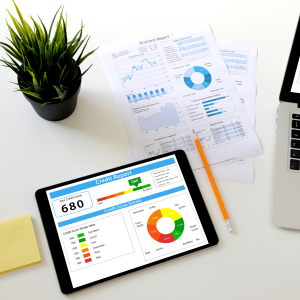
The Difference Between Your Credit Score And Credit Report
Understanding the nuances of your financial health can be a daunting task, especially when it comes to the often-confused concepts of credit scores and credit reports. In this comprehensive guide, we will demystify the difference between these two essential aspects of your financial life. By the end of this article, you’ll have a clear understanding of what each entails, how they impact your financial well-being, and how to leverage this knowledge to your advantage.
What is a Credit Report?
A credit report serves as a comprehensive record of your financial history. It’s a compilation of data from various sources, including credit providers, credit unions, banks, payday lenders, store credit issuers, and information supplied by phone and utility companies. This report provides a detailed snapshot of your financial behavior and credit-related activities over time.
So, what exactly can you expect to find within your credit report? Let’s break down the key components:
Personal Information: This section includes your name, gender, birthday, driver’s license number, address, and employment history. It forms the foundational details of your financial profile.
Credit Enquiries: Your credit report will reveal the number of times you’ve made enquiries into your credit history. Each time you apply for credit or a loan, it generates a credit enquiry, and these enquiries are documented in your report.
Repayment History: Your repayment history is a critical aspect of your credit report. It tracks whether you meet your repayments on time, any missed or late payments, and the overall pattern of your payment behavior.
Defaults: Defaults represent debts of $150 or more that were not paid within 60 days and have been listed by your credit provider. These negative entries can significantly impact your creditworthiness.
It’s important to note that the Privacy Act of 1988 regulates the information included in your credit report, governing how and when it may be accessed. This legislation aims to strike a balance between consumer privacy and the need for credit providers to access essential data to make informed lending decisions. Importantly, you have the right to review your credit report annually, free of charge.
Your credit report is generally not modifiable unless there is evidence of inaccurate information. Under the Privacy Act, you have the option to dispute any inaccuracies you encounter in your report. To initiate this process, you can contact the team here at Clear Credit Solutions on 1300 789 783 or fill in our enquiry form and we will contact you to get the process started.
What is a Credit Score?
In contrast to a credit report, a credit score is a single numerical representation of your creditworthiness. It condenses the wealth of information found in your credit report into a single number, making it easier for lenders to quickly assess your credit risk. In Australia, one of the prominent credit scoring systems is the Equifax Credit Score.
Do you know what factors actually have no effect on your credit score?
The Equifax Credit Score takes the information within your credit report at a specific moment and converts it into a number that falls within a range of 0 to 1,200. While your credit report offers detailed insights, the credit score provides a simplified assessment of your trustworthiness as a borrower.
It’s important to understand that two individuals with the same credit score may not necessarily have identical information within their credit reports. This underscores the complexity of the factors that influence a person’s credit score.
Equifax employs a comprehensive credit scoring system developed over decades of expertise in credit reporting. When you check your Equifax Credit Score, it will be presented as a number, along with a percentage range indicating where you stand in comparison to other Australians with good or excellent credit. The percentage ranges are as follows:
- Below average (bottom 20 per cent)
- Average (21-40 per cent)
- Good (41-60 per cent)
- Very good (61-80 per cent)
- Excellent (81-100 per cent)
Understanding where you fall within these ranges can provide valuable insights into your creditworthiness and help you gauge your financial standing in relation to others.
Utilizing Credit Repair for a More Promising Financial Future
At Clear Credit Solutions, we recognize the profound impact that a good credit score can have on your financial life. That’s why we are committed to helping you remove negative defaults from your credit file, ultimately empowering you to secure finance when needed.
We hope this article has provided clarity on thedifference between your credit score and credit report. However, it’s important to remember that this knowledge is just the beginning. As you navigate the complex world of personal finance, understanding these concepts will serve as a valuable foundation for making informed financial decisions.
If you have further questions or require assistance with credit repair, don’t hesitate to reach out to our dedicated team. Your credit score and credit report are dynamic aspects of your financial health, and with the right knowledge and resources, you can take control of your financial future. Trust Clear Credit Solutions to guide you on this journey towards improved creditworthiness and greater financial opportunities.
Top Useful Articles
Contact Us
At Clear Credit Solutions, we are the credit repair experts and can help when it comes to negative listings on a credit file.
Get in contact with our friendly staff for a free credit repair assessment today. No admin or investigation fees, no charge per default and a full refund guarantee so there is no risk! You can either call 1300 789 783 or fill in our enquiry and we will call you today.
